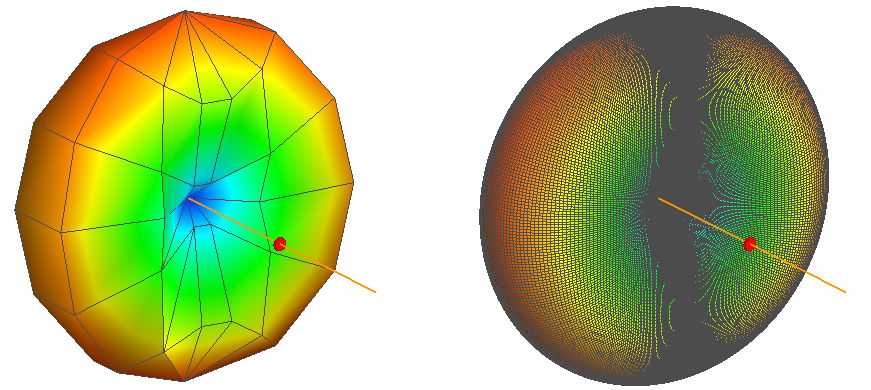Advanced Settings for Far Field Requests
Use advanced settings to specify the currents taken into account for the calculation of fields, the export of far field data, ignoring the radiated contribution from impressed sources, calculating spherical modes and calculating the far field for an array of elements.
On the Request tab, in the
Solution requests group, click the ![]() Far fields icon. The advanced settings are available on the Scope tab and
Advanced tab.
Far fields icon. The advanced settings are available on the Scope tab and
Advanced tab.
Specify the Currents Taken Into Account During Field Calculation
- Field calculation using all sources
- With this option, the currents on all structures are taken into account when calculating the far field result.
- Field calculation using only sources on elements with specified labels
- With this option, only the currents on structures with specified labels are taken into account when calculating the far field result.
Export Directivity or Gain
This setting controls what is written to file (either directivity or gain).
- Directivity
- This option writes out the directivity to the selected output files (.out and .ffe file).
- Gain
- This option writes out the gain to the selected output files (.out and .ffe file).
Export Far Field Data
- Export fields to ASCII file (*.ffe)
- This option exports the far fields to a .ffe file. Use this file for further post-processing or, when using spherical coordinates, as source pattern for a radiation pattern point source or a receiving antenna.
- Export fields to *.out file
- This option exports the fields to the .out file.
- Only determine radiated far field power by integration
- This option calculates the far fields and the total radiated power but the
field values are not written to the .bof or .out
output files.Tip: Use this option if the individual field values are not required and the output files would otherwise become too large. Far field values will not be available for viewing in POSTFEKO or for optimisation in OPTFEKO.
Far Field Interpolation
- Calculate continuous far field data
- This option uses interpolation to display far field data in POSTFEKO.

Figure 1. The result of a 3D pattern far field request with and = 13 points (on the left) and the result of a 3D pattern far field request with = 7 and = 13 points with the Calculate continuous far field data option selected (to the right).
Ignore Radiated Contribution from Impressed Sources
- Calculate only the scattered part of the field
- This option ignores the radiated contribution from impressed sources (for
example, electric point source, magnetic point source) as well as
contribution from plane wave sources, yielding only the scattered
fields.Note: The default setting is recommended.
Spherical Mode Options
- Calculate spherical expansion mode coefficients
- This option calculates the coefficients and exports to a
.sph (TICRA) file.Note: Set the radiated power in Feko to 4 Watts to ensure the gain in GRASP will be correct.
- Specify number of modes
- This option allows you to specify the maximum mode index. If no value is specified, the maximum mode index is calculated automatically.
- Export spherical expansion coefficients to ASCII file
- This option exports the spherical expansion mode coefficients to an ASCII file.
Periodic Boundary Condition Options
- Calculate far field for an array of elements
- This option allows the far field to be calculated for an array of elements.